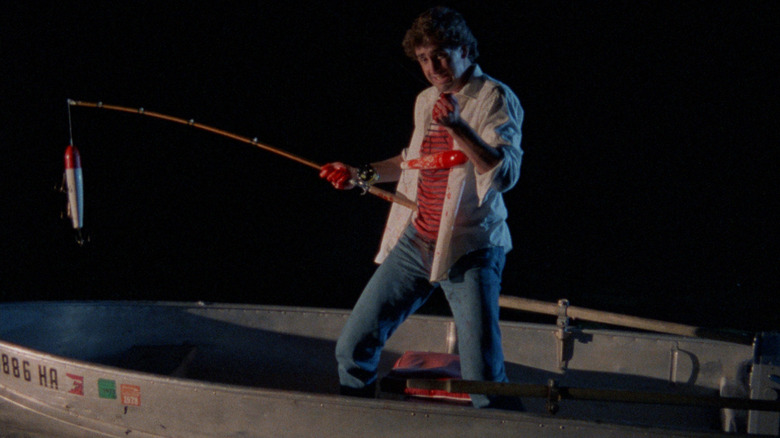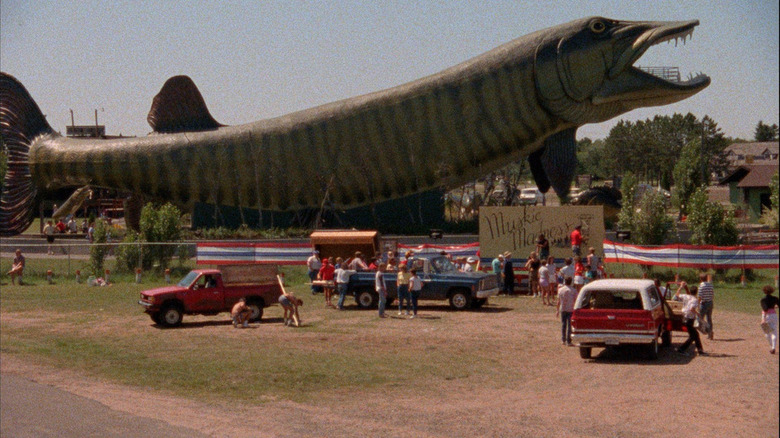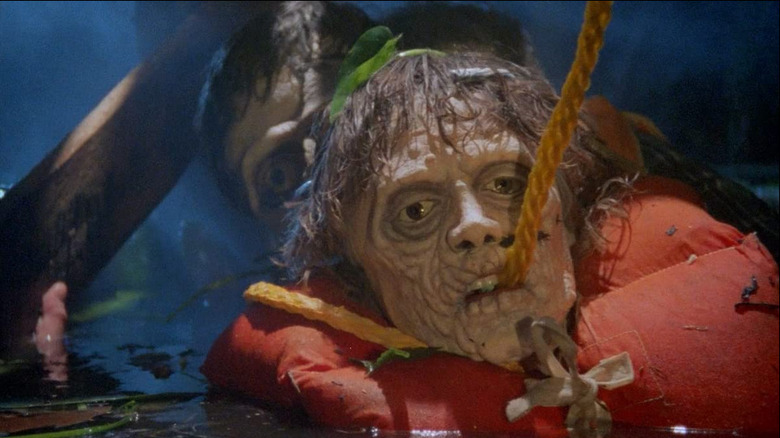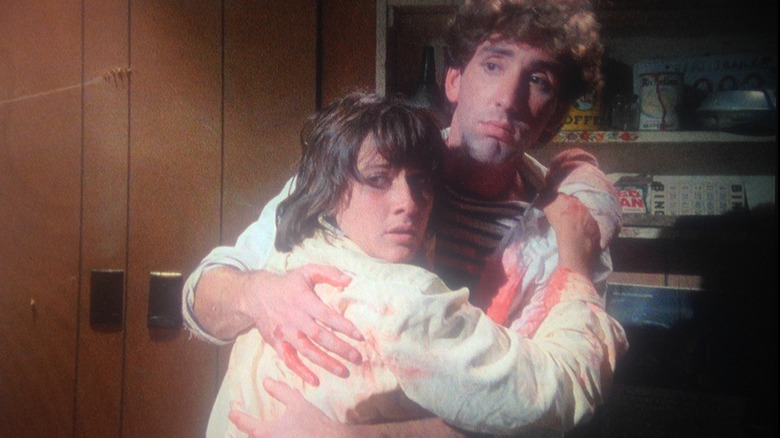The Troma Movie That Brought The Mystery Science Theater 3000 Crew Together
There are movies so flawless in their construction that they appear to have been born, not made. Then there's "The Toxic Avenger." Released in 1984 by indie studio Troma, the film was a rickety mess compared to its Hollywood competition. But that's exactly what the studio set out to make. "Here was a movie with all the seams showing," said Troma co-founder Lloyd Kaufman, "which made it all the more approachable from an audience's point of view." Fans of the movie didn't just think, "That movie was bonkers," but, "I wonder if I can make a movie like that?" Kaufman and his co-founder Michael Herz hoped to leverage their newfound infamy to usurp the throne of Roger Corman, the reigning king of trash filmmaking. If Corman had opened the door to a new breed of director and actor in his movies, they thought, why couldn't Troma?
As of 2022, the studio has not yet achieved its ambitions. While its name retains cache among hardcore film buffs, Kaufman admits that Troma "hasn't made money in a decade." The studio also lacks the stable of former talent that came to define Corman's career as a director and producer. But there have been success stories. James Gunn rose from writing the script for Troma classic "Tromeo and Juliet," to directing fan-favorite horror movie "Slither" and then "Guardians of the Galaxy." Plus, "South Park" creators and professional edgelords Trey Parker and Matt Stone had their first film, "Cannibal! The Musical," distributed by Troma after everybody else turned them down. Then there was Jim Mallon, a director hailing from Minneapolis. Just a few years after directing the Troma film "Blood Hook," he would find himself on the ground floor of one of the most influential comedy series ever: "Mystery Science Theater 3000."
Muskie Madness
"Blood Hook" is a slasher movie with one key difference. While past killers had stalked their prey with knives, claws, guns and chainsaws, "Blood Hook" armed its murderer with a fishing rod. Whether sitting in a boat, swimming in the waters, or lying down on a dock, the hook would come for you. Victims are dragged into the water, strangled by fishing line and even have their ears torn off by the hook. It ends with a climactic, if rushed, fishing duel. Unfortunately the film was far too long in its original cut, running for nearly two hours. Troma cut thirty minutes for their release, but "Blood Hook" never won the notoriety enjoyed by studio classics like "Bloodsucking Freaks." When "Parks and Recreation" used footage from the film in an episode, they would call it "Death Canoe 4," not "Blood Hook."
"Blood Hook" may have been a footnote in the history of Troma, but it's also a major landmark on the road to "Mystery Science Theater 3000." Before directing the film, Mallon had met a man named Kevin Murphy while working at Madison's WHA-TV in Wisconsin. Mallon was in the single camera video department, while Murphy had a spot on the remote truck crew. Mallon hired Murphy for "Blood Hook" as key grip, the one responsible for managing the "grip crew" that positions film cameras. He would later hire him once again as a cinematographer at the Minneapolis television channel KTMA, where "Mystery Science Theater 3000" was born. Murphy served as a writer on the team for over a decade, and voiced the character Tom Servo for eight seasons (taking over from the initial voice actor, Josh Weinstein.) He's since collaborated with former "Mystery Science Theater 3000" talent like Michael Nelson and Bill Corbett on "RiffTrax."
Fishing for trouble
Joel Hodgson, the original creative producer of "Mystery Science Theater 3000," also bears a connection to "Blood Hook." Mallon claims that he first encountered Hodgson in the warehouse right next to the one where they were editing the film. We can only guess at what Joel was doing in that warehouse. Perhaps he was at the t-shirt factory where he worked until he joined KTMA. Or perhaps he was, as he reflects in Wired's oral history of the show, "collaging robots out of objects I found at the Salvation Army." Mallon was not the only one on the team with an affinity for trash.
For many years, Mallon's legacy has been challenged by fans of "Mystery Science Theater 3000." When the show was created, Hodgson and Mallon split the rights 50/50. Hodgson would supervise the ideas, and Mallon would keep the program running smoothly behind the scenes. But Hodgson left the team in 1993. Years later, he would admit that his departure was not the amicable split he had claimed in interviews, but was instead born out of frustration with Mallon's lack of quality control. Mallon himself asserts that Hodgson failed to realize the show was a team project, rather than Hodgson's alone. Whoever you believe, it should be noted that staff members like Trace Beaulieu and Frank Conniff have gone on record saying that, as the original producer, Mallon continues to claim the full royalties from "Mystery Science Theater 3000" to this day. Rather than Hodgson, Murphy or Nelson, the man who now benefits the most from the show's existence is the director of "Blood Hook."
Hook, line, and sinker
I will give Mallon some credit. While Hodgson proposed the central gimmick of actors talking over bad movies, it was Mallon who figured out where those bad movies would come from. "KTMA had a tiny program budget and therefore had purchased some of the cheapest movie packages on the market," he said. Buried somewhere in the halls of mediocre footage, he hoped, was bad movie gold. As the director of "Blood Hook," Mallon had already received training in making art quickly and on the cheap. Hodgson himself had experienced the same, building puppets out of found objects. In creating "Mystery Science Theater 3000," the two of them sought to make something worthwhile out of imposingly tight constraints. They not only succeeded, but created a format durable enough to last even after founding members like Hodgson left the project.
Many of the cast and crew who participated in "Blood Hook" have never worked on another film. Their memories of the production may constitute the film's greatest legacy, rather than those of audiences who saw it in theaters or on video. But then, the same could have been said for the infamous "Manos: The Hands of Fate," a local experiment, swiftly forgotten, until Comedy Central got their hands on it and sent the film to the "Mystery Science" crew. Perhaps one day, "Blood Hook" will find its people, just like "The Toxic Avenger" once did. This day may come sooner rather than later. In the years following "Mystery Science Theater 3000," fans have sought out similarly hapless projects like "Fateful Findings" and "Troll 2." Similarly, Troma's influence can be felt in the programming selections of film festivals like Fantastic Fest. Big corporate blockbusters might rule the multiplexes, but the appreciation of sincere shlock has become well and truly democratized. We are all Tom Servo now.



